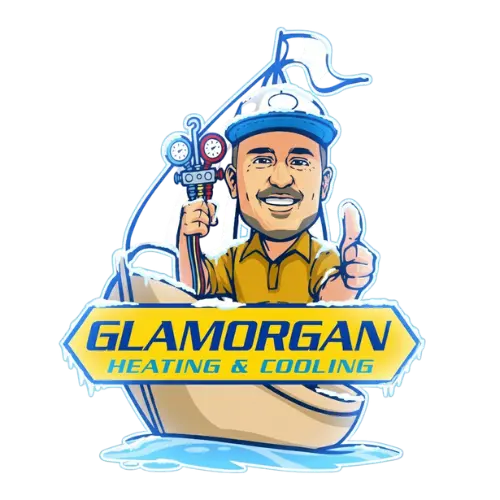August 2025 AC Filter Tips help New York homeowners keep cooling costs down, protect their systems, and improve indoor air quality during peak summer heat. Replacing filters every 30 days, choosing the right MERV rating, cleaning the filter slot, and scheduling August tune-ups all support reliable comfort across the Capital Region.
August 2025 AC Filter Tips can make or break your cooling system’s performance during one of the hottest months of the year. For homeowners in New York, now is the time to take simple steps that improve air quality, reduce utility bills, and prevent AC breakdowns.
In this guide, we’ll walk through the most important August 2025 AC filter tips to help your HVAC system perform at its best. Whether you live in Troy, Clifton Park, or anywhere in the Capital Region, Glamorgan Heating & Cooling has your back with expert maintenance and fast service.
Why Does AC Filter Maintenance Matter in August 2025?
August brings the peak of summer heat, meaning your air conditioner is working harder than ever. A clean AC filter is your system’s first defense against restricted airflow, poor indoor air quality, and rising energy bills, especially when your system runs for longer cycles in extreme heat.
TL;DR: A clean filter keeps air moving, reduces strain on your AC, and helps prevent midsummer breakdowns.
- Improves airflow and system efficiency on hot August days.
- Reduces allergens, dust, and particles circulating in your home.
- Helps prevent system overheating, icing, and costly repairs.
How Often Should You Change AC Filters in August?
During August, your AC runs more frequently, causing filters to clog faster than they do in spring or fall. A dirty filter reduces airflow, forces your system to work harder, and shortens its lifespan. Homes with pets, smokers, or high pollen exposure may see filters clog even sooner.
TL;DR: Check your filter every 30 days in summer and replace it as soon as it looks dirty or discolored.
- Tip: Set a monthly reminder on your phone labeled “August AC filter check” so it’s never forgotten.
- Tip: Keep a small stock of replacement filters on hand to avoid last-minute store runs.
What MERV Rating Is Best for August 2025 AC Filter Use?
Filters are rated by MERV (Minimum Efficiency Reporting Value). Higher ratings capture smaller particles but can restrict airflow if your HVAC system isn’t designed for them. Selecting the correct filter ensures a balance between cleaner air and strong system performance during peak cooling season.
- Tip: Most New York homeowners do well with a MERV 8 to 11 filter, which captures common dust, pollen, and pet dander without over-restricting airflow.
- Tip: Ask our team if your unit supports higher-rated filters for improved allergen control before upgrading.
Which AC Filter Type Is Right for Your Home?
| Filter Type | Typical MERV Range | Best For |
|---|---|---|
| Fiberglass (disposable) | MERV 1–4 | Basic protection, low-cost rentals, minimal filtration needs |
| Pleated (standard) | MERV 8–11 | Most single-family homes, pets, everyday dust and pollen |
| High-efficiency pleated / media | MERV 11–13+ | Allergy sufferers, homes needing finer filtration (only if system is compatible) |
| HEPA add-on systems | MERV 17+ equivalent | Severe allergies, special health needs, and dedicated IAQ setups |
How Do You Keep the Filter Slot Clean?
Dust, pet hair, and debris can collect in and around the filter slot. Even with a new filter, buildup in the housing can restrict airflow and reduce efficiency, especially during heavy August usage when every bit of airflow matters.
- Tip: Turn off your system, remove the old filter, and wipe down the compartment with a damp cloth or vacuum hose before inserting a new filter.
- Tip: Make a quick visual check for gaps so the filter seats snugly and air doesn’t bypass the filter frame.
Should You Upgrade to HEPA or Media Filters in August?
If your home includes allergy sufferers, pets, or someone with respiratory sensitivities, HEPA and media filters offer higher protection by trapping more fine particles. However, these filters can change system static pressure, and not all HVAC units are designed to handle them.
- Tip: Book a quick system check with Glamorgan to confirm compatibility before installing any high-efficiency or specialty filter.
- Tip: Consider pairing upgraded filters with professional duct cleaning and indoor air quality add-ons for the best results.
What’s the Right Way to Replace an AC Filter?
Simple August Filter Change Checklist:
- Turn off your HVAC system at the thermostat before starting.
- Locate the filter (return grille, furnace cabinet, or air handler slot).
- Slide out the old filter and note the airflow arrow direction.
- Check the old filter for heavy dust, discoloration, or odor.
- Clean the filter slot or compartment with a cloth or vacuum.
- Insert the new filter with arrows pointing toward the blower or unit.
- Restore power and listen for normal airflow once the system starts.
How Do AC Filters Connect to Indoor Air Quality in August?
Filters are just one part of the air quality puzzle. In humid August conditions, mold spores, bacteria, and allergens can spike, especially in tight, well-insulated homes. Indoor air quality add-ons enhance what your filter can capture and help keep your home fresher.
- Tip: Consider UV lights to target mold and bacteria on coils and in ductwork.
- Tip: Whole-home air purifiers and dehumidifiers can work alongside your filter to control particles and humidity.
August 2025 AC Filter Tips for Capital Region Homes
Homes in Troy, Clifton Park, Albany, Halfmoon, and surrounding Capital Region communities rely heavily on AC in August, when heat and humidity peak. Local factors like pollen, nearby trees, and older ductwork can all impact how quickly filters clog.
Glamorgan Heating & Cooling understands New York’s climate and provides tailored filter recommendations, indoor air quality solutions, and full-system tune-ups for Capital Region homeowners who want dependable comfort through late summer.
Frequently Asked Questions: August 2025 AC Filter Tips
▸ What happens if I don’t change my AC filter in August?
A clogged filter restricts airflow, making your system run longer and harder to reach the same temperature. This can lead to higher energy bills, uneven cooling, frozen coils, overheating parts, and in some cases, complete system shutdown.
▸ What is MERV and why does it matter for AC filters?
MERV stands for Minimum Efficiency Reporting Value, a rating that shows how effectively a filter captures particles of different sizes. Higher MERV numbers catch smaller particles, but if they’re too high for your system, they can reduce airflow and strain your equipment.
▸ How do I know what size AC filter I need?
Check the side of your existing filter for dimensions (for example, 16x20x1). If the label is missing or hard to read, measure the length, width, and thickness with a tape measure and match those numbers when purchasing replacements.
▸ Are washable or reusable AC filters a good idea?
Washable filters can work in some systems but must be cleaned and dried thoroughly to avoid mold and airflow issues. Many homeowners prefer disposable pleated filters because they are easy to replace, offer consistent performance, and require less maintenance.
▸ Can a better filter help with allergies in August?
Yes. Higher-MERV pleated filters and compatible media or HEPA-style solutions can capture more pollen, dust, and dander. For best results, pair filter upgrades with indoor air quality products like purifiers and dehumidifiers and confirm that your system can handle the added filtration.
▸ How much energy can I save by replacing a clogged AC filter?
According to the ENERGY STAR official site, replacing a clogged air filter with a clean one can lower your air conditioner’s energy consumption by about 5 to 15 percent, especially during heavy summer use.
Schedule Your August AC Filter Service with Glamorgan
By following these August 2025 AC filter tips, you can avoid many of the most common late-summer AC problems. Cleaner filters mean smoother airflow, lower bills, and better comfort. At Glamorgan, we go beyond filter swaps with full-system inspections, air quality upgrades, and honest recommendations tailored to New York homes.
Take control of your comfort today. Call (518) 723‑0392 or claim your Summer 2025 HVAC Promo and schedule a service before your system is pushed to the limit.
Related Services:



